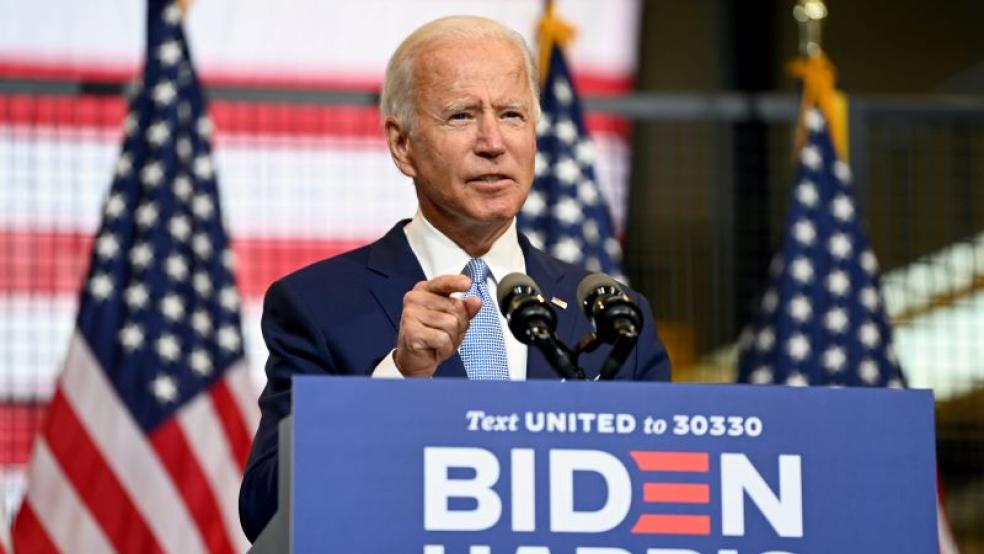When he’s not slinging dubious accusations of corruption, attacking Joe Biden’s son, Hunter, or propagating conspiracy theories, President Trump has frequently been hitting the former vice president on his tax plans, warning that they will prompt an economic depression.
“Remember, BIDEN is going to raise your taxes at a level never seen before. This will not only be very costly for you, it will destroy our economy, which is coming back very rapidly,” Trump tweeted Wednesday.
He later added: “The Radical Biden-Harris Agenda is projected to slash the typical American’s income by $6,500 per year. They will raise TAXES by $4 TRILLION DOLLARS – triggering a mass exodus of jobs out of America and into foreign countries.”
The facts: Biden has proposed raising the corporate tax rate from 21% to 28%; raising the top individual income tax rate from 37% to 39.6%; lifting the income cap on Social Security payroll taxes; and taxing capital gains at regular income rates for those making more than $1 million a year. He insists that he will not raise taxes on people making less than $400,000 a year. Independent analyses have found that Biden’s tax plans would raise about $2.5 trillion in revenue over 10 years, with the burden of those higher taxes falling almost entirely on businesses and high earners — and with relatively little effect on economic growth. For more details, see here, here, here or here.
On the other hand, former Trump White House economists Kevin Hassett and Casey B. Mulligan released a study last week that said that Biden’s plans would result in about 5 million fewer jobs and about $2.6 trillion less in gross domestic product by 2030. The report estimated that Biden’s agenda would cost the median family about $6,500 in income by 2030, the source for Trump’s claim on the stump. But the methodology of that study has come under criticism for unfairly penalizing Biden for tax cuts set to expire as part of the 2017 Republican tax law. “I’m trying not to be overly partisan, but I think they’ve put their thumb on the scale in that way,” Rich Prisinzano, director of policy analysis for the Penn Wharton Budget Model, tells Bloomberg Businessweek.
A bad time for tax hikes? The bigger question surrounding Biden’s plan at the moment is whether it’s would be wise to raise taxes when the economy has been weakened by the coronavirus pandemic. Asked about that during his ABC town hall last week, Biden said: “Absolutely.” The Biden camp argues that the investments in infrastructure and other areas that the former vice president proposes to fund through tax hikes would pay off with stronger growth — though Biden acknowledged he would still need to get the congressional votes to pass such legislation.
The New York Times’s Jim Tankersley and Thomas Kaplan explained the debate earlier this week:
“Republicans have long asserted that any Democratic proposals to raise taxes would hurt the economy, regardless of whether it was booming or ailing. In recent years, including in the Democratic presidential primaries this year, Democrats and liberal economists have more forcefully argued the opposite: that raising taxes on the rich to fund government spending that bolsters the productivity of the United States economy will accelerate economic growth.”
Stimulus first: Even as Biden defends his tax-hike proposals, The Washington Post’s Jeff Stein reports that the former vice president isn’t likely to pursue those plans as part of any short-term stimulus meant to fuel recovery from the effects of the pandemic. “However, the former vice president would likely aim to include his tax increases if Congress approves his proposed permanent spending plans, such as expansions in child care, health care or education,” Stein writes, citing two sources familiar with the campaign’s thinking. “A Biden campaign aide confirmed that his commitment to paying for spending priorities did not include short-term stimulus measures.”
The bottom line: The economic arguments are one thing, but don’t ignore the political challenges inevitably involved with just about any tax hikes. As Stein suggests: “Biden may still face significant political obstacles in securing passage of his various tax hike proposals even if his party controls both the House and the Senate.”





